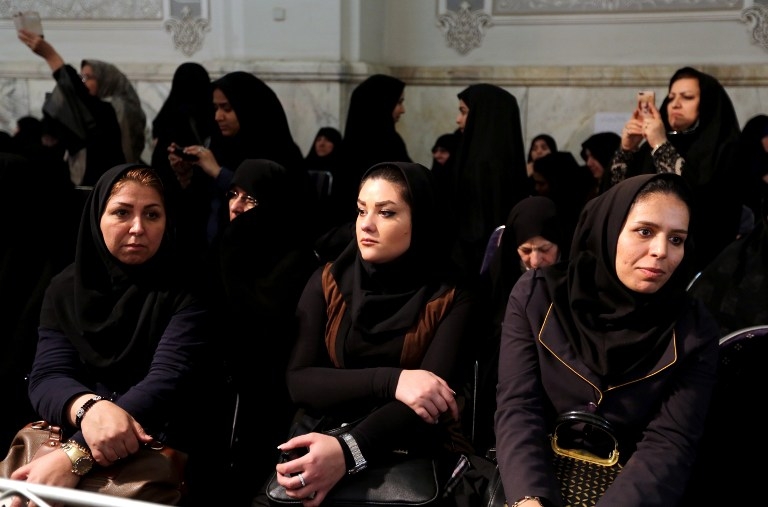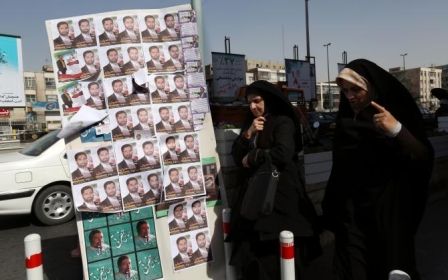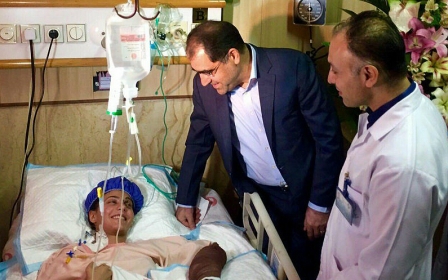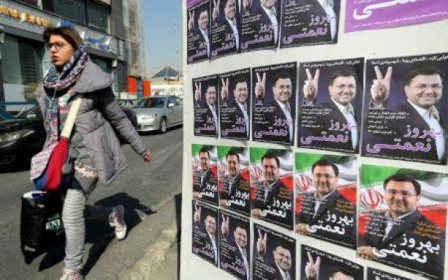Iran's women MPs face uphill battle for gender parity
Iranian women want equal representation in parliament but face an uphill task to secure enough seats to represent half the country

Women attend a meeting of Iran's conservative parties, ahead of upcoming parliamentary elections (AFP)
Published date: Jeudi 25 février 2016 - 10:54
|
Last update: 8 années 9 mois ago
by Arthur MacMillan
TEHRAN - It's a statistic that belies claims of equality: women hold just nine of Iran's 290 parliamentary seats. And they are highly unlikely to reverse the disparity in Friday's elections.
Representation has never neared parity - 14 is the highest number of female MPs ever elected - and it has prompted a campaign, "Changing the male face of parliament."
The group has set a target of 50 female lawmakers, a huge leap forward on the current three-percent level of representation.
"Whether it be in parliament or the Assembly of Experts, we are seeking to tackle discrimination," female activist Jila Shariatpanahi, an author and leading member of the campaign, told AFP.
The Assembly of Experts is a powerful committee of clerics that supervises the Islamic republic's Supreme Leader Ayatollah Ali Khamenei.
The Guardian Council, a constitutional watchdog that vets election candidates, excluded all 16 women seeking one of the assembly's 88 seats, meaning the panel, which will pick Khamenei's successor when he dies, will remain male only.
Breaking the gender gap would not be unprecedented. The first Assembly of Experts after the Islamic revolution of 1979 included a woman, Monireh Gorji.
'We want 50 percent'
Women make up 50.4 percent of Iran's population, according to the last census.
But despite the cabinet of the country's President Hassan Rouhani having three female ministers, all vice presidents, women still dramatically lag behind men in high office.
Shariatpanahi, a physicist on Iran's nuclear programme between 1975 and 1987, has studied Islamic texts closely and says their interpretation, not the actual words, is to blame.
"I have reached the conclusion that we need to present new interpretations. If we have this, there won't be this much discrimination imposed on women on religious grounds," she said.
Rouhani's appointment of female vice presidents - who hold the portfolios for women, legal affairs and the environment - was a positive step.
But with more women than men in university, Shariatpanahi says there can be no educational justification for the shortfall.
The campaign is urging female and male voters alike to back candidates who do not have an "anti-women record" in public office or in their careers.
"Our ultimate goal, over time, is to get 50 percent of parliament's members to be women," she said, stressing that age-old traditions must be broken down.
It will be a hard task.
Of the 4,844 candidates in Friday's parliamentary polls only about 10 percent are women.
"We cannot make a sudden jump, it's more a case of step by step. First, there must be cultural change in the people, and then cultural change from officials," said Shariatpanahi.
'Traditionalists fear change'
The rival conservative and reformist blocs in the election have both sought to address the issue.
Six women are on the main conservative list contesting the 30 seats in Tehran, while eight women are on the rival reformist list.
Somayeh Tahmasebi, head of the women's section of Etemad-e Melli (National Trust), a reformist party in The List of Hope coalition backing Rouhani, was among the women barred from running for the Assembly of Experts.
"Since the revolution our women have reached higher levels of education and achieved various specialities, but their demands have not been realised when compared to their qualifications," she said.
"Our officials, who are mainly men, need to reach this conclusion and offer positions more suitable to educated women. This requires cultural change."
The issue has resonated strongly in the election campaign, with a gathering of female reformists, many of them young, chanting "Equal Rights for Women" at a pro-Rouhani gathering last week.
"Traditionalists exist in all societies and one of their characteristics is that they fear change, and fear what could replace them," said Tahmasebi, 52.
"They always think they will lose if the current situation is altered. But we hope reformists can manage this atmosphere better... and realise women's and youths' demands."
Middle East Eye propose une couverture et une analyse indépendantes et incomparables du Moyen-Orient, de l’Afrique du Nord et d’autres régions du monde. Pour en savoir plus sur la reprise de ce contenu et les frais qui s’appliquent, veuillez remplir ce formulaire [en anglais]. Pour en savoir plus sur MEE, cliquez ici [en anglais].




